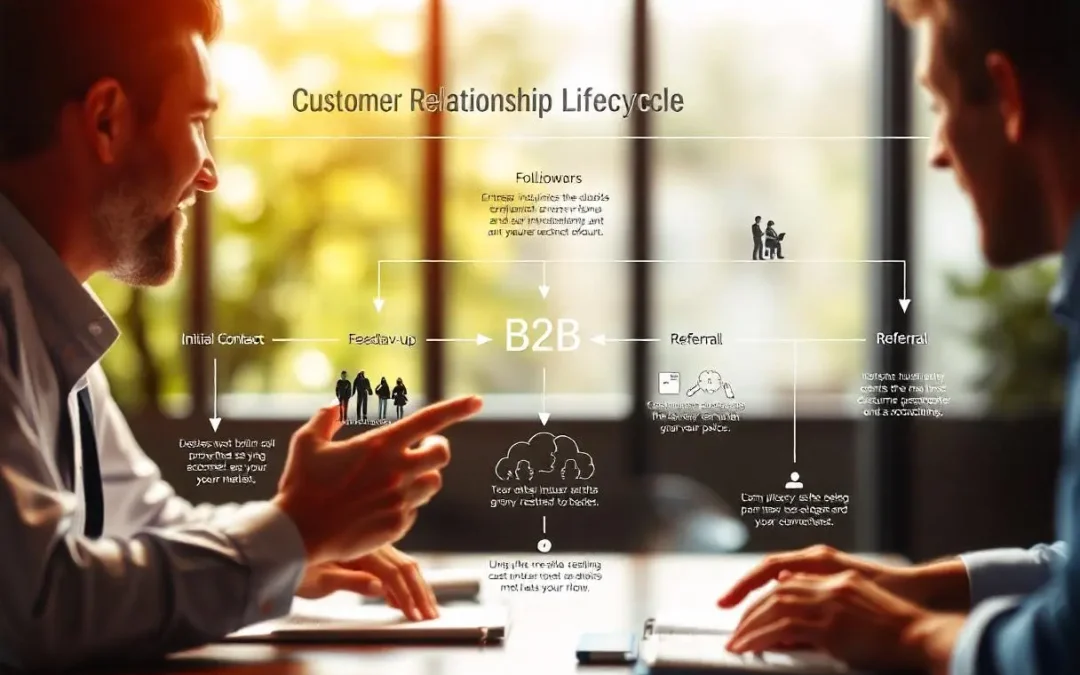crm for business to business- In today’s fast-paced business landscape, maintaining strong relationships with clients is crucial for success, especially in the B2B (business-to-business) sector. A robust Customer Relationship Management (CRM) system can effectively facilitate these relationships, streamline processes, and enhance customer satisfaction. In this comprehensive guide, we will explore the importance of CRM in B2B operations, the best practices for leveraging CRM platforms, and how to select the right CRM tool for your business.
Understanding CRM in the B2B Context
What is CRM?
Customer Relationship Management (CRM) is a strategy and technology that companies use to manage and analyze customer interactions and data throughout the customer lifecycle. CRM systems help businesses improve relationships with customers, streamline processes, and improve profitability.
Why is CRM Important for B2B?
- Enhanced Customer Relationships : B2B transactions often involve longer sales cycles and more complex customer relationships. A CRM system can track all interactions, ensuring personalized communication and attention.
- Streamlined Processes : Automating routine tasks—such as follow-up emails, lead management, and customer support—can save time and resources, allowing teams to focus on strategic initiatives.
- Data-Driven Decision Making : A CRM provides valuable insights and analytics that can guide your business strategy, identify sales trends, and forecast future sales performance
Key Features of a B2B CRM System
1. Contact Management
A central database where all client contacts are stored allows for easy access to updated information, communication history, and preferences.
2. Sales Management
A CRM helps track sales pipelines, manage leads, and forecast revenue, ensuring that your sales team can operate efficiently.
3. Reporting and Analytics
Comprehensive reporting features allow businesses to measure performance, assess customer behaviors, and create actionable insights.
4. Marketing Automation
Integrating marketing efforts within the CRM streamlines campaigns, tracks performance, and helps nurture leads through targeted communications.
5. Customer Support Integration
Integrating customer support channels (like emails, calls, and chats) into a CRM system provides a seamless experience, ensuring clients receive prompt assistance.
Selecting the Right CRM for Your B2B Needs
Assessing Your Business Requirements
- Understand Your Goals : Identify what you are looking to achieve with a CRM system — whether it’s improving customer support, boosting sales, or enhancing marketing efforts.
Key Considerations
- User-Friendly Interface : Choose a CRM that is easy for your team to navigate, as this will encourage widespread adoption.
- Integration Capabilities : Ensure that the chosen CRM can integrate seamlessly with your existing tools, such as email clients, marketing platforms, and accounting software.
- Scalability : Select a CRM that can grow with your business, offering additional features and user access as your needs increase.
Evaluating CRM Options
- Salesforce : A robust CRM that offers extensive customization options and advanced analytics. Ideal for larger B2B companies with complex needs.
- HubSpot CRM : A user-friendly platform that comes with a free tier, making it accessible for small to medium-sized businesses. It integrates well with marketing and sales tools.
- Zoho CRM : Offers a comprehensive suite of features at competitive pricing. Great for businesses looking for customization and extensive tool integration.
- Pipedrive : A sales-focused CRM that provides visual pipelines to manage leads effectively. Excellent for sales teams seeking simplicity.
- Freshsales : Provides features like lead scoring and built-in phone and email capabilities. Good for medium-sized businesses that prioritize sales management.
Best Practices for B2B CRM Success
1. Define Your Processes
Clearly define your sales processes and customer engagement strategies before implementing a CRM. This ensures alignment across your team.
2. Train Your Team
Effective training ensures that all team members are equipped to use the CRM’s features. Regular training sessions can improve proficiency and system utilization.
3. Monitor and Evaluate Performance
Use the reporting tools available within the CRM to track key performance indicators (KPIs) related to sales, customer engagement, and support.
4. Integrate Customer Feedback
Continually seek feedback from customers to identify areas for improvement in your service and CRM usage. This customer-centric approach can enhance retention.
5. Automate Routine Tasks
Utilize the automation features within your CRM to minimize mundane tasks and free up time for your team to focus on building relationships and closing deals.
Overcoming CRM Adoption Challenges
Resistance to Change
Many team members may hesitate to adopt a new system. Clear communication about the benefits of the CRM and ongoing support can help ease this transition.
Data Quality Issues
Migrating data into a new CRM can be fraught with challenges. Ensure a thorough data cleansing process before migration to maintain quality and accuracy.
Ensuring System Adoption
To drive CRM usage, engage team members throughout the selection and implementation process, and foster a culture that encourages feedback and collaboration.
Conclusion
Understanding and effectively implementing CRM systems for business to business (B2B) operations can significantly enhance customer relationships and operational efficiency. By selecting the right CRM, leveraging its features, and following best practices, your business can thrive in today’s competitive landscape. Don’t underestimate the impact of a well-utilized CRM; it can be the driving force behind your organization’s success.
Call to Action
Have you experienced using a CRM system in your B2B operations? Share your thoughts and experiences in the comments below! Don’t forget to explore our other articles for further insights into enhancing your business strategies!


